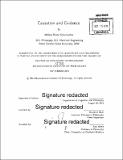| dc.contributor.advisor | Bradford Skow. | en_US |
| dc.contributor.author | Schumacher, Melissa Renée | en_US |
| dc.contributor.other | Massachusetts Institute of Technology. Department of Linguistics and Philosophy. | en_US |
| dc.date.accessioned | 2016-03-03T21:06:41Z | |
| dc.date.available | 2016-03-03T21:06:41Z | |
| dc.date.issued | 2015 | en_US |
| dc.identifier.uri | http://hdl.handle.net/1721.1/101525 | |
| dc.description | Thesis: Ph. D. in Linguistics, Massachusetts Institute of Technology, Department of Linguistics and Philosophy, 2015. | en_US |
| dc.description | Cataloged from PDF version of thesis. | en_US |
| dc.description | Includes bibliographical references. | en_US |
| dc.description.abstract | This work addresses questions about causation and evidence: How can we learn what causes what? Can we get evidence for objects that don't cause anything? And what is the evidential relationship between events in a causal loop? Structural equations accounts of causation seem to provide a good basis for discovering causal relationships through observation. But these accounts can sometimes give the wrong verdict in cases that are structurally similar to cases that they do get right. Distinctions between default and deviant states, and between more and less normal worlds, have been introduced to solve this problem. In "Defaults, Normality, and Control" I argue that both of these kinds of solution introduce new problems without solving the old one. I propose a different theory of causation based on the structural equations account, designed to capture the intuition that the causes of an event are whatever could have, by not occurring, most easily prevented that event. In the philosophical literature, Occam's Razor is standardly taken to be a constraint on the amount of (types of) objects a theory can be justifiably committed to. In "Occam's Razor and Philosophical Objects" I introduce an interpretation of Occam's Razor that doesn't fit that standard mold, but gives plausible answers to the questions "What is theoretical simplicity?" and "Why should we believe the simpler theory?". I then apply it to abstract and non-fundamental objects, and show that theories that include such objects need be no more complex than theories that don't. We can therefore be justified in believing such theories, even though they make the same predictions about observables as alternative theories. In "Playing Dice With a Time Machine: A New Puzzle About Causal Loops", I use an original puzzle case to bring out the problem of calculating the probabilities of events in a causal loop, and I propose a solution. I also point to some difficulties involved in reaching that solution. | en_US |
| dc.description.statementofresponsibility | by Melissa Renée Schumacher. | en_US |
| dc.format.extent | 110 pages | en_US |
| dc.language.iso | eng | en_US |
| dc.publisher | Massachusetts Institute of Technology | en_US |
| dc.rights | M.I.T. theses are protected by copyright. They may be viewed from this source for any purpose, but reproduction or distribution in any format is prohibited without written permission. See provided URL for inquiries about permission. | en_US |
| dc.rights.uri | http://dspace.mit.edu/handle/1721.1/7582 | en_US |
| dc.subject | Linguistics and Philosophy. | en_US |
| dc.title | Causation and evidence | en_US |
| dc.type | Thesis | en_US |
| dc.description.degree | Ph. D. in Linguistics | en_US |
| dc.contributor.department | Massachusetts Institute of Technology. Department of Linguistics and Philosophy | |
| dc.identifier.oclc | 939918465 | en_US |

